Editor’s Note: This is the second installment examining private education reform. The first installment by Kay Matthews examined how the ideology and foundation of the national corporate reform movement came about.
Part 2: Reform in New Mexico – Outside interests dictate policy and narrative
“When it comes to K through 12 education, we see a $500 billion sector in the U.S. alone…” -Rupert Murdoch
The chairman and CEO of News Corp. made the above statement in late 2010 when announcing the purchase of 90 percent of Wireless Generation, a privately held education technology firm. The company now operates as a subsidiary under News Corp’s Amplify Education, which focuses on testing assessments, digital curriculum aligned with Common Core Standards, and proprietary hardware in the form of tablets. Wireless Generation currently holds a contract with the New Mexico Public Education Department to provide technology and curriculum services for K-3 education.
If the thought of a company owned by the founder of Fox News providing tax-funded educational services to New Mexico’s youngest students furrows your brow, it’s unfortunately just the tip of the iceberg in a race for public education dollars and for-profit reform contextualized in Part 1 by Kay Matthews.
In New Mexico, “education reform” encompasses a number of different areas: standardized testing, teacher’s evaluations, high-school graduation requirements, and virtual charter schools, to name a few. To get an accurate understanding of the sweeping changes taking place in public education, it’s helpful to understand how the major players shaping and advancing these changes view it: as a market, and an opportunity to take billions of dollars allocated in state budgets for public education and transfer them to private coffers.
When Rupert Murdoch jumped into the for-profit education game in 2010, he plopped down $360 million in cash for a company that already had contracts in 50 states with services reaching more than 200,000 teachers and 3 million students. He was, in fact, late to the game as many corporations were already making deep inroads to state contracts to help facilitate compliance with federal education changes and Common Core standards. Although that purchase made Murdoch’s News Corp an instant player, in New Mexico the behemoth that would gain a foothold in nearly every facet of the state’s education system would be Pearson Education, the for-profit learning arm of a multi-billion dollar publishing empire.
Pearson currently holds contracts in New Mexico for drafting and administering teacher evaluations, supplying textbooks, operating a public virtual charter school, and licensing rights for the GED test. The company also has an undue influence on New Mexico education policy in what many regard as a pay-to-play relationship with Education Secretary-Designate Hanna Skandera.
The ability for companies like Pearson to gain access to numerous revenue streams earmarked for public education is facilitated by a complex network of various stakeholders claiming to be concerned about improving education standards and school choice. It can be boiled down to the following variables: legislation that opens up contracting opportunities with states, PR campaigns led by faux-local think tanks affiliated with the corporations that helped write said legislation, and politicians with veto power willing to push through corporate reform strategy at all costs.
Carrying Water for Big Ed
In late 2010 Susana Martinez was elected Governor of New Mexico after receiving $10,000 directly from the Koch brothers and over $1 million dollars from the Republican Governor’s Association (RGA). The Koch brothers are known for bankrolling a right-wing agenda aimed at privatizing public services. The RGA aggressively pursues education reform and in 2012 were recipients of over $1 million directly from David Koch.
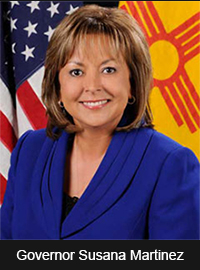 Even before Martinez had taken office, she chose an out-of-state “reformer” as her nomination for public education secretary. Hanna Skandera had been groomed in for-profit education reform as a fellow at the Hoover Institution at Stanford. The conservative organization advocates for “individual, economic, and political freedom” as well an emphasis on “private enterprise.” According to the organization, “Hoover scholars produce an impressive body of books, provocative essays, and in-depth articles that explore ideas with the potential to transform society.” In Skandera’s case, these published works resulted in a string of co-written, simplistic blog-like pieces that contribute to an ideological foundation for the private takeover of public education. According to former professor of education policy, Emanuele Corso:
Even before Martinez had taken office, she chose an out-of-state “reformer” as her nomination for public education secretary. Hanna Skandera had been groomed in for-profit education reform as a fellow at the Hoover Institution at Stanford. The conservative organization advocates for “individual, economic, and political freedom” as well an emphasis on “private enterprise.” According to the organization, “Hoover scholars produce an impressive body of books, provocative essays, and in-depth articles that explore ideas with the potential to transform society.” In Skandera’s case, these published works resulted in a string of co-written, simplistic blog-like pieces that contribute to an ideological foundation for the private takeover of public education. According to former professor of education policy, Emanuele Corso:
In December, 2003 Ms. Skandera appeared at a luncheon as a Hoover Research Fellow with her mentor and distinguished Hoover Institute professor, Richard Sousa. Interestingly, Sousa is best known as an expert on labor economics and, incidentally, K-12 education. Sousa and Skandera reported on their research and offered suggestions for improving education through school choice, testing and accountability.
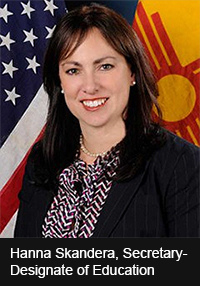 Former Hoover Fellows include the likes of Condoleezza Rice who oversaw sweeping privatization changes in the U.S. military as Secretary of State under George W. Bush, Newt Gingrich who proposed privatizing Social Security, and the granddaddy of modern privatization and free-market ideology Milton Friedman.
Former Hoover Fellows include the likes of Condoleezza Rice who oversaw sweeping privatization changes in the U.S. military as Secretary of State under George W. Bush, Newt Gingrich who proposed privatizing Social Security, and the granddaddy of modern privatization and free-market ideology Milton Friedman.
Before being nominated by Martinez, Skandera served as an Undersecretary for Education for Governor Arnold Schwarzenegger and implemented the “A-F” grading system for schools in Florida under Governor Jeb Bush.
Skandera is a member of the Jeb Bush-founded Foundation for Excellence in Education (FEE), which advocates for private solutions to public education problems. FEE also works closely with the American Legislative Exchange Council (ALEC), the conservative, pro-privatization group that produces opportunity-creating legislation for its corporate sponsors at the state level. According to the nonprofit Center for Media and Democracy:
Aptly named FEE, Bush’s group is backed by many of the same for-profit school corporations that have funded ALEC and vote as equals with its legislators on templates to change laws governing America’s public schools. FEE is also bankrolled by many of the same hard-right foundations bent on privatizing public schools that have funded ALEC. And, they have pushed many of the same changes to the law, which benefit their corporate benefactors and satisfy the free market fundamentalism of the billionaires whose tax-deductible charities underwrite the agenda of these two groups.
Although FEE no longer discloses its donors, the Washington Post reported that New Mexico contractors K12 Inc., Pearson Education and News Corp’s Amplify, have given money to the organization.
In early 2011 Skandera formed an advisory team stacked with current and past members of Jeb Bush’s administration, many with direct ties to FEE. Not one member of her advisory team was from New Mexico.
One of her advisors was FEE Senior Policy Fellow Christy Hovanetz who, according to emails obtained by the non-profit In The Public Interest and reported in the Santa Fe Reporter, “had significant influence over education-reform bills in New Mexico—even before Skandera officially named her as an adviser.”
According to In The Public Interest:
FEE staff served as advisors to acting education commissioner Hanna Skandera. FEE, and, by extension, its donors, had great influence over New Mexico legislation. In a Jan., 2011 email, Skandera directs a staffer from the legislature to forward all education bills to FEE's Christy Hovanetz for edits: "Can you send all Governor's office ed bill language to Christy, including social promotion?" Another FEE staffer, Mary Laura Bragg wrote to Skandera, "I'm at your beck and call."
In New Mexico much of the recent debate about vouchers, school grading, standardized testing, and teacher evaluations comes directly from ALEC model bills pushed through by legislators with ALEC ties. ALEC, whose motto is “Limited Government, Free Markets and Federalism,” publishes a yearly “Report Card” that gives states an education ranking based off how much ALEC model legislation has been pushed through in that state.
ALEC’s corporate-crafted bills are made to sound innocuous. Efforts to evaluate student standing and assess teacher performance are logical strategies in confronting education woes, especially in New Mexico where seemingly dismal graduation and literacy rates are trumpeted in the local media and used as political fodder. What’s less obvious and even less logical is the fact that companies currently doing business with the state, like Pearson, K12 and Amplify, have a hand in writing education legislation through ALEC and are then allowed to customize bills by proxy through Skandera’s handoffs to FEE.
The ALEC/FEE dual push was illustrated in legislation that setup an A-F grading system for New Mexico schools. According to a 2011 story by the American Independent, “In 2007, [Jeb]Bush, along with Zachariah Zachariah and Brian Yablonski (both of whom have been under investigation by the SEC), founded the Foundation for Excellence in Education, a group that helped draft last year’s New Mexico senate bill 427, the so-called ‘education reform’ bill introduced by Senator Vernon Asbill.” At the time he introduced the bill, Sen. Asbill was a member of ALEC and the legislation was based on “The A-Plus Literacy Act,” an ALEC model bill.
The influence of ALEC on state legislatures went relatively unnoticed for years until recent scrutiny by watch dog groups and some national media outlets. Longtime Albuquerque journalist Denise Tessier reported in August of this year about the lack of coverage the Albuquerque Journal has given to ALEC’s influence within our state. She cites the Center for Media and Democracy figures in listing 17 current state legislators who are also members of ALEC. When former legislative members are included the list jumps to 26. ALEC is known to keep its membership list under wraps so it’s possible there are more. To get an idea of the strategic head start that ALEC and its corporate education sponsors have on affecting state legislation to their favor, the Report Card listed above was ALEC’s 18th.
Astroturfing Reform
The corporate reform apparatus utilizes a PR campaign comprised of “local” think tanks in every state across the country. These organizations are funded by larger national think tanks that are in turn heavily funded by the Koch brothers and other privatization interests. These non-profits fly the Libertarian flag of “free-market” public policy solutions with a consistent podium granted in editorial sections by newspapers across the country. In New Mexico the Rio Grande Foundation functions in this capacity.
According to the Albuquerque Journal’s Thomas Cole in an “UpFront” piece dedicated to the organization and its funders:
The work of the Rio Grande Foundation includes reports on public policy issues, opinion articles for news outlets around the state and operation of the New Mexico Watchdog and Capitol Report New Mexico websites.
Authors associated with the foundation are frequent contributors to the opinion pages of the Journal, with more than 80 articles appearing since 2001.
Operating as a 501(c)(3) nonprofit, the Rio Grande Foundation isn’t legally obligated to disclose its donors but the Journal cites tax returns for nonprofit organizations that funnel money to the organization. These groups include the Donors Capital Fund and the Koch-funded Donors Trust. Mother Jones magazine reported in early 2013:
The Donors Trust… has steered hundreds of millions of dollars to the most influential think tanks, foundations, and advocacy groups in the conservative movement. Over the past decade, it has funded the right's assault on labor unions, climate scientists, public schools, economic regulations… It is the dark-money ATM of the right.
The Albuquerque Journal also noted the Rio Grande Foundation’s affiliation with the Franklin Center for Government & Public Integrity and the State Policy Network, two far-right organizations that foster an information network of think tanks similar to the Rio Grande Foundation across the country.
MediaMatters, a progressive media watchdog, had this to say of the Franklin Center:
The Franklin Center is a multimillion-dollar organization whose websites and affiliates provide free statehouse reporting to local newspapers and other media across the country. Funded by major conservative donors, staffed by veterans of groups affiliated with the Koch brothers, and maintaining a regular presence hosting right-wing events, the organization boasts of its ability to fill the void created by state newsroom layoffs.
The Center for Media and Democracy notes the State Policy Network’s ties to ALEC:
The State Policy Network (SPN) has franchised, funded, and fostered a growing number of “mini Heritage Foundations” at the state level since the early 1990s….All of SPN's 64 member state think tanks have pushed parts of the ALEC agenda in their respective states, and at least 34 of them have additional direct ties to ALEC (beyond SPN's own ties as an ALEC funder). SPN think tanks have introduced, echoed, pushed, and reinforced ALEC policies to hamstring labor, privatize education, disenfranchise minorities, students, and the elderly, and rollback environmental initiatives in the states.
 Paul Gessing is the President of the Rio Grande Foundation and a former lobbyist for the National Taxpayers Union (NTP), a nonprofit “citizen group whose members work every day for lower taxes and smaller government at all levels.” The NTP is a member of ALEC and its current president Duane Parde is ALEC’s former Executive Director. In an interview with NPR’s Terry Gross, the national chairman of ALEC, Noble Ellington, stated that NTP is at the table with ALEC’s large corporate funders when drafting model legislation.
Paul Gessing is the President of the Rio Grande Foundation and a former lobbyist for the National Taxpayers Union (NTP), a nonprofit “citizen group whose members work every day for lower taxes and smaller government at all levels.” The NTP is a member of ALEC and its current president Duane Parde is ALEC’s former Executive Director. In an interview with NPR’s Terry Gross, the national chairman of ALEC, Noble Ellington, stated that NTP is at the table with ALEC’s large corporate funders when drafting model legislation.
Former New Mexico legislator Hal Stratton was the founder of the Rio Grande Foundation. In 1981, he was given the “ALEC Legislator of the Year award.” In 2009, the Rio Grande Foundation hosted the Director of ALEC’s Health and Human Services Task Force, “one of the nation’s leading experts on free market health care.”
Virtual Schools Concrete Profits
One of the most insidious examples of this stew of corporate influence is the New Mexico Connections Academy, a completely online “virtual” charter school that was originally denied a charter by the Public Education Commission. The publicly elected commission was overruled by Secretary Designate Skandera on appeal and the charter was granted.
The application for the charter school was submitted in part by State Sen. Mark Boitano and the Rio Grande Foundation’s Paul Gessing. Sen. Boitano was listed on ALEC’s Education Task Force Membership Directory in August, 2011. He was also one of the original drafters of the 1999 New Mexico Charter Schools Act. According to the Albuquerque Journal, “Gessing emphasized that the school is not a project of the foundation,” yet on the original letter of intent for the charter application he used the Rio Grande Foundation’s address and email for his personal contact information.
The original notice of intent also noted that New Mexico Connections Academy effectively acts as “an operating affiliate of Connections Education LLC,” a Pearson-owned company that is an active member of ALEC. That language was dropped in the subsequent charter application. Also dropped were the names of the original members of the application team except for Paul Gessing. The two additional individuals were Dr. Alan Morgan, an advisor from Pearson Education, and Dr. Donna Hutchison of Pearson’s Connections Education. Hutchison wrote the original letter of intent to the Public Education Commission.
Michael Corwin of the now-defunct Independent Source PAC called into question the constitutionality of two aspects of the virtual charter. According to the New Mexico Charter Schools Act: “The governing body shall not contract with a for-profit entity for the management of the charter school.” It also states, “A charter school shall be a nonsectarian, nonreligious and non-home-based public school.” (Emphasis mine)
New Mexico Connections Academy attempts to get around the first issue with the following verbiage in their application:
It is important to note that the contract does not include management of the school, which is prohibited by NMSA 1978 22-8B-4R. The NMCA Governing Board will maintain responsibility for ensuring that the charter school program meets all educational, fiscal and programmatic goals outlined in the charter.
But who’s on the NMCA governing board? According to the NMCA website, the board consists of former Sen. Boitano who’s by trade a realtor; Carlo Lucero, the owner of a maintenance company and member of various business boards; the previously mentioned Paul Gessing; Yvonne Duhigg, a property manager; Patrick Chavez, a civil engineer; and Jeanine Robinson, a former special education assistant who owns a bookkeeping business and is on the Executive Committee of the Republican Party of Santa Fe County. Robinson also submitted a letter of intent for another K-12 virtual charter school in early 2013. No one on the council holds any significant experience that would lead to the necessary “educational, fiscal and programmatic” oversight of the school.
Carolyn Shearman, the current Public Education Commission Chair, expressed concerns for the virtual charter school that included monitoring class attendance and teacher-to-student ratio. When speaking at the appeal hearing for NMCA she recalled attending a charter school conference and learning that “some virtual schools have student-teacher ratios as high as 450 students to 1 teacher.” She also asked, “How do you do site visits that are required by New Mexico statute… how do you site visit a virtual school? It’s literally impossible.”
An analysis by USA TODAY uncovered a significant percentage of public money that goes to virtual charter schools is being used on advertising to attract students, “even as brick-and-mortar public schools in the districts they serve face budget crunches.” The piece notes that nearly $100 million in taxpayer dollars has been spent by the 10 largest for-profit providers since 2007.
K12 Inc. is the nation’s largest virtual school provider and operates New Mexico Virtual Academy in Farmington. Like Pearson, K12 Inc. is deeply entrenched with ALEC and FEE. After having its original statewide charter denied by the Public Education Commission, it sought and was denied charters in Las Cruces and Rio Rancho before being accepted in Farmington. Lydia Todd, the director of school operations, told the Tri-City Tribune, “There are 300 students enrolled with 281 from outside of this area…” When asked by a Farmington school board member about face-to-face visits, Todd said they could be done “over the computer.”
An in depth nationwide study on K12 Inc. by the National Education Policy Center found students of that virtual school scored significantly lower on math and reading compared to brick-and-mortar public students. The schools also have a significantly higher student turnover rate and “spend more on overall instructional costs than comparison schools – including the cost of computer hardware and software, but noticeably less on teachers’ salaries and benefits.”
In September of this year, Politico reported that across the country nearly $2 billion in taxpayer dollars are being diverted to virtual schools managed by for-profit companies with bleak results. “In state after state, online school after online school posts dismal scores on math, writing and science tests and mediocre scores on reading.” The story noted a report by the Ohio Department of Education that showed six of that state’s biggest cyber schools “all got Fs on their state progress reports…” Those six schools got a total of $218 million in public funding. K12 Inc. and Connections Academy were both on that list.
Does this matter to K12 Inc.? Politico goes on:
After K12’s stellar earnings report last month, analysts on a call with top executives didn’t ask a single question about academic performance. And despite its notably poor results in schools across the country, K12 won approval to open new schools in states including Florida, Kansas, Michigan, South Carolina and Ohio this fall.
While teachers in New Mexico are being bashed for questioning an assessment formulated by a for-profit, out-of-state company, online schools like K12 Inc. encourage their teachers to ignore poor performance.
K12 Inc… explicitly encourages teachers to forgive strings of zeros on homework and quizzes if the student can later show he’s learned the concepts. Otherwise, kids who fail to do any work for weeks might get discouraged and drop out, said Allison Cleveland, an executive vice president at K12. “We shouldn’t create an environment for students that they can’t overcome,” she said.
As the Martinez administration enforces the corporate education agenda of its funders and affiliates, the state slips further into perilous social and economic territory under its watch. In 2012, New Mexico infant deaths jumped past the national average for the first time in nearly twenty years. New Mexico ranked dead last in child well-being in 2013 by the Annie E. Casey Foundation’s Kids Count Data Book. New Mexico had never ranked above 40th in the 20-plus years of its publication. A report by Feeding America ranked New Mexico first in child hunger. In 2012, over 15,000 people left the state and between April and October of this year the state lost 20,382 jobs.
Dr. Veronica Garcia, former Cabinet Secretary of Education under Governor Bill Richardson, recently spoke with New Mexico Mercury about childhood poverty in New Mexico. Unlike Skandera, who has no prior experience in any New Mexico public education setting, Dr. Garcia worked for decades in various capacities within the state’s public education system. She stresses over and over the effect poverty has on educational performance and the need to invest in early childhood resources.
Recent pushbacks to corporate reform have been taking place across the state. Kathy Korte, Albuquerque Public School Board Vice-President, recently initiated an effort to notify parents of their right to opt-out of some state-mandated standardized tests. The school board denied her motion. Senate Majority Whip Tim Keller recently stated that he may introduce legislation that would allow parents to opt-out their children from participating in standardized tests. Earlier this year, Rep. Mimi Stewart introduced legislation that would bar corporations from running virtual charter schools. But is it too late?
Every aspect of the nationwide corporate reform formula is active in New Mexico. Pearson, K12 Inc., ALEC, FEE and the Koch brothers are literally dictating the state’s education policy. While Skandera and Martinez act as employees for these interests, they’ve turned every single New Mexico taxpayer into an unwitting customer. It is the crowning achievement of a corporate strategy decades in the making. The education of this country’s children and the sustainability of the classroom as a public good are mere footnotes in the tapping of an American resource never meant to be “a market.”

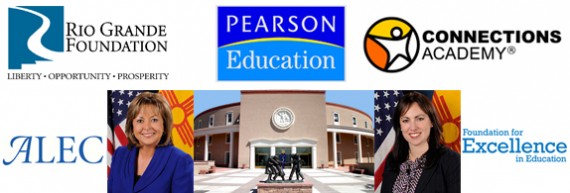
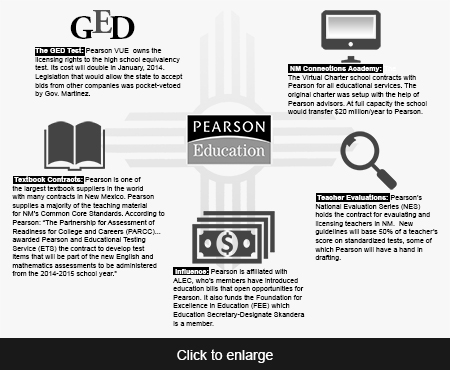
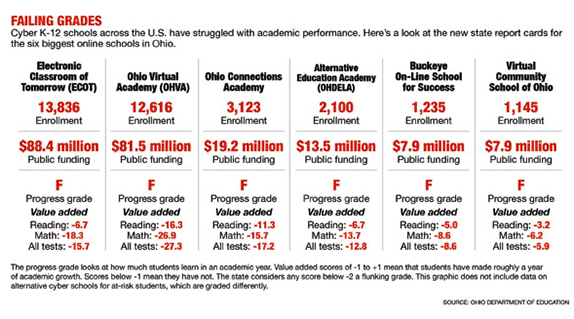
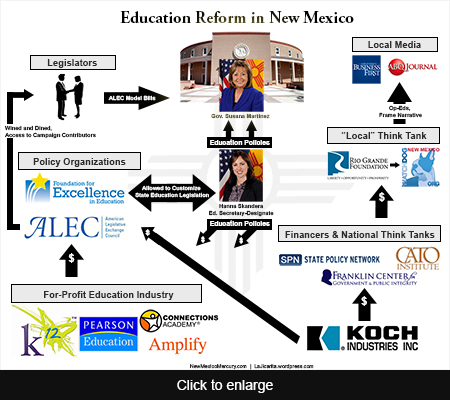


Responses to “The Invasion of Corporate Education Reform - Part 2”